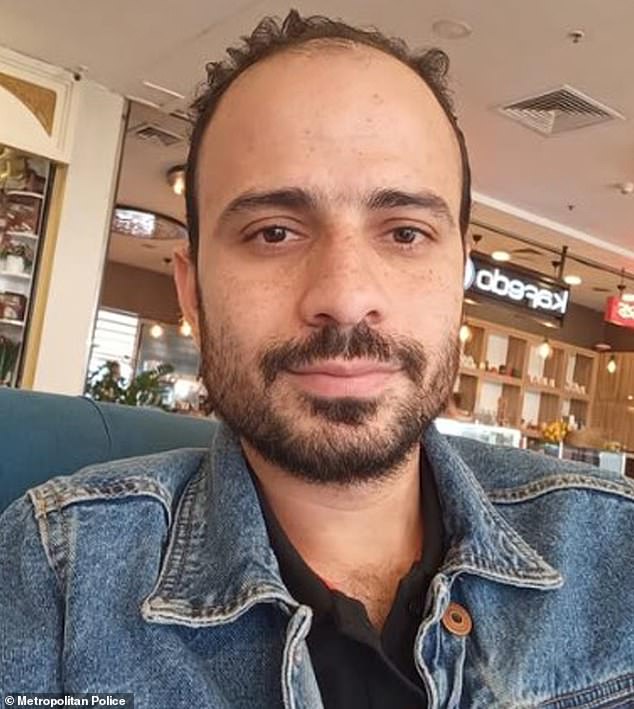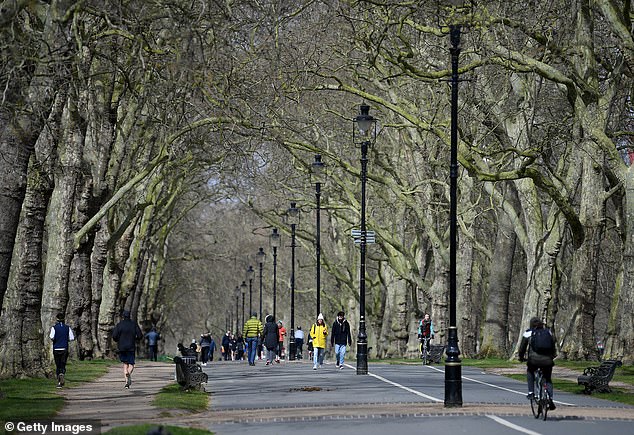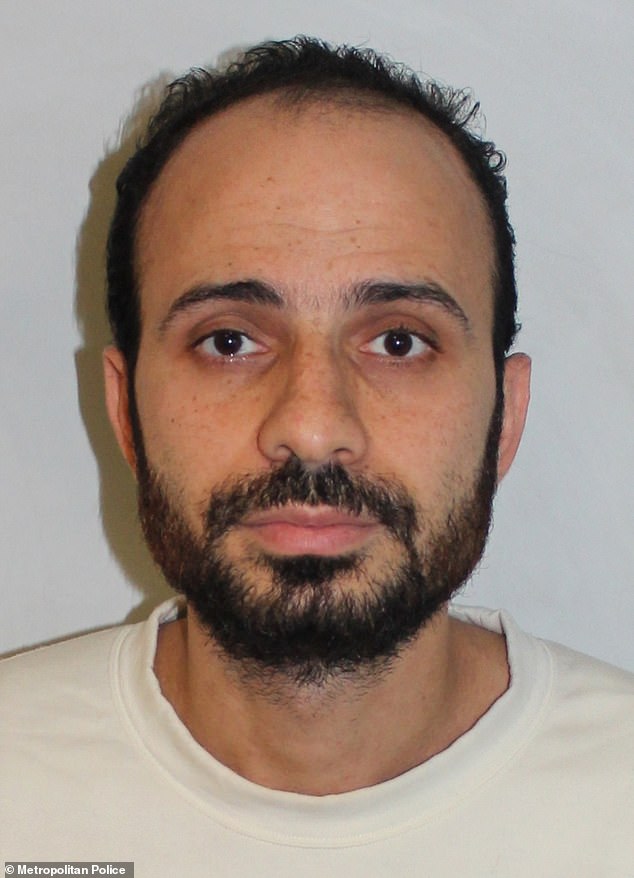An Egyptian asylum seeker who was jailed for raping a woman in London‘s Hyde Park is a convicted Islamic terrorist, the Daily Mail can reveal.
Abdelrahmen Adnan Abouelela, 42, was found guilty in his absence of being part of a bomb-making cell in Egypt and given a seven-year jail sentence on May 5, 2015.
He and six other men were said to have manufactured explosives in a safe house flat to carry out ‘terrorist’ acts such as the bombing of electricity pylons and gas lines.
The Daily Mail can reveal that Abouelela, a member of the radical Muslim Brotherhood movement, escaped from Egypt before being convicted.
He claimed asylum when he arrived in the UK in April 2023, and was housed in taxpayer-funded hotel accommodation while his application was considered.
Abouelela was allowed to wander around freely and even posed for a selfie picture in January last year outside the Imperial War Museum North Museum in Trafford, Greater Manchester.
Home Office officials spent 17 months pondering over whether or not to grant his asylum application, despite apparently knowing of his bomb-making conviction, before he raped the vulnerable woman in Hyde Park last November.
Court records in Egypt reveal that Abouelela and his six accomplices rented an apartment in the Ebnia Baitak area of the sprawling 10th of Ramadan City east of Cairo where they made their bombs.

Abdelrahmen Adnan Abouelela, 42, who was jailed for raping a woman in London’s Hyde Park is a convicted Islamic terrorist, the Daily Mail can reveal

The 42-year-old was convicted of rape on May 22 and was jailed for eight-and-a-half years on Tuesday
Abouelela was staying in a four-star Hilton Hotel in Ealing, courtesy of the British taxpayer, when he carried out his attack.
He was convicted of rape at Southwark Crown Court on May 22 this year and was jailed for eight and a half years on Tuesday.
Abouelela is believed to have lived for periods in Malaysia and Sudan after he fled from Egypt, and apparently first claimed political asylum when he arrived in Turkey.
He was detained for at least 72 days at Ataturk airport in Istanbul after his asylum request was reportedly turned down by Turkish authorities in early 2019.
Abouelela desperately battled attempts to extradite him back to Egypt before Turkish authorities apparently relented and allowed him to stay in Turkey.
In a video posted online during his detention, he stated in Arabic that he was a member of the Egyptian ‘opposition’ who had been detained for 72 days. He added: ‘I don’t know what will happen to me.’
But social media posts by Abouelela and his LinkedIn profile suggest he was allowed to remain living happily in Turkey which has expressed staunch support for the Muslim Brotherhood in recent years
Abouelela got married in December 2020, according to his Facebook profile, and went on to have a child with his wife.
But he later left Turkey and claimed asylum when he arrived in the UK in April 2023, saying that he would face persecution if he was returned to his native Egypt.
It is unclear whether he was forced to leave Turkey or did so under his own volition, although it was revealed in court this week that his wife and child remain living there.

The former engineering student faces automatic deportation at the end of his sentence as he will have been behind bars for over a year
Abouelela faces automatic deportation under the UK Borders Act 2007 after serving his sentence for rape as he will have served a sentence of over a year in prison.
But astonishingly, he could potentially manage to stay if he launches a successful legal appeal on the grounds that deportation would breach his rights under the European Convention on Human Rights or the UK’s obligations under the Refugee Convention.
Abouelela’s membership of the Muslim Brotherhood or one of its affiliates was revealed in a 2019 report about his detention at Ataturk airport by the Saudi state-owned international Arabic news channel Al Arabiya.
The Muslim Brotherhood is regarded as a terror organisation in many countries, although it is not banned in the UK
The report stated that he had moved to Turkey from Sudan, but faced extradition back to Turkey on ‘explicit terrorism charges’.
It added that Turkish authorities had initially decided to extradite him before having a change of heart and releasing him.
During his time in Turkey, he repeatedly posted religious messages on Facebook and openly criticised the regime of Egypt’s president Abdel Fattah Saeed Hussein Khalil el-Sisi.
In one post, he described members of the Muslim Brotherhood as his ‘brothers’ while another described how he had been briefly imprisoned in Egypt in 2015 by the ‘dogs’ of the el-Sisi regime.
In yet another post after arriving in the UK, he marked the 11th anniversary of the Rabaa massacre in Cairo when El-Sisi, then the defence minister, cleared two camps of supporters of ousted Egyptian president Mohamed Morsi, killing hundreds of civilians.
Abouelela referenced those who died on August 14, 2013, stating in Arabic, ‘Oh God, make their blood a curse on their killers’.
The Muslim Brotherhood was founded in Egypt in 1928 and arrived in Britain around 60 years ago, although it remains a collection of loosely associated’ groups rather than a single entity.
David Cameron’s Government decided not to ban the movement in 2015, despite individuals ‘closely associated’ with the group having supported suicide bombing and other attacks in Israel by Hamas.
Mr Cameron stated in a written reply to MPs that a Government review had found the movement was ‘deliberately opaque, and habitually secretive’, and characterised Western societies and liberal Muslims as ‘decadent and immoral’.
He added that parts of the Brotherhood had ‘a highly ambiguous relationship with violent extremism’ and had been ‘a rite of passage for some individuals and groups who have gone on to engage in violence and terrorism.’
Although the Brotherhood had stated its opposition to al Qaida, it had ‘never credibly denounced’ the terrorist group’s use of the work of Sayyid Qutb, one of the Brotherhood’s most important historic figures, he said.
But he pulled back from banning the group, despite saying that aspects of the Brotherhood’s ‘ideology and activities run counter to British values of democracy, the rule of law, individual liberty, equality and the mutual respect and tolerance of different faiths and beliefs’.
Instead, the former prime minister stated that membership or association with the Brotherhood should ‘be considered as a possible indicator of extremism’, and that the movement’s activities should be kept under review.

He wasn previously found guilty in his absence of being part of a bomb-making cell in Egypt and given a seven year jail sentence on May 5, 2015
Countries that have labelled and outlawed the Muslim Brotherhood as a terrorist organisation include Austria, Bahrain, Egypt, Saudi Arabia, and the United Arab Emirates.
Abouelela’s trial at Southwark Crown Court heard how he approached his victim as she was walking home alone from a night out at about 9pm before luring her to a secluded spot in Hyde Park and raping her.
Judge Gregory Perrins told him at the sentencing hearing: ‘You thought absolutely nothing of her.’
The judge added: ‘It must have been obvious to you that she was a woman under the influence of alcohol who was alone and vulnerable. You made the decision to take advantage of her vulnerability.
‘You were driven purely by your own sexual desires. You simply did not care that she could not consent: you just took what you wanted.’
The judge said Abouelela was in the country illegally, having claimed asylum for fear of persecution in Egypt where he claimed he was held as a political prisoner and tortured.
Abouelela’s defence barrister Kane Sharpe said he had been diagnosed with emotionally unstable personality disorder and complex PTSD.
Judge Perrins, however, stated he found this mitigating factor to be ‘minimal’, adding: ‘There is little connection between those circumstances and your decision to rape the victim on that night.
‘It’s clear to me you do not believe you have done anything wrong.’
The judge further commended the victim, who cannot be named for legal reasons, for her ‘immense bravery and courage’ in giving evidence during Abouelela’s trial.












